
aiocache
Asyncio cache manager for redis, memcached and memory
Stars: 1197
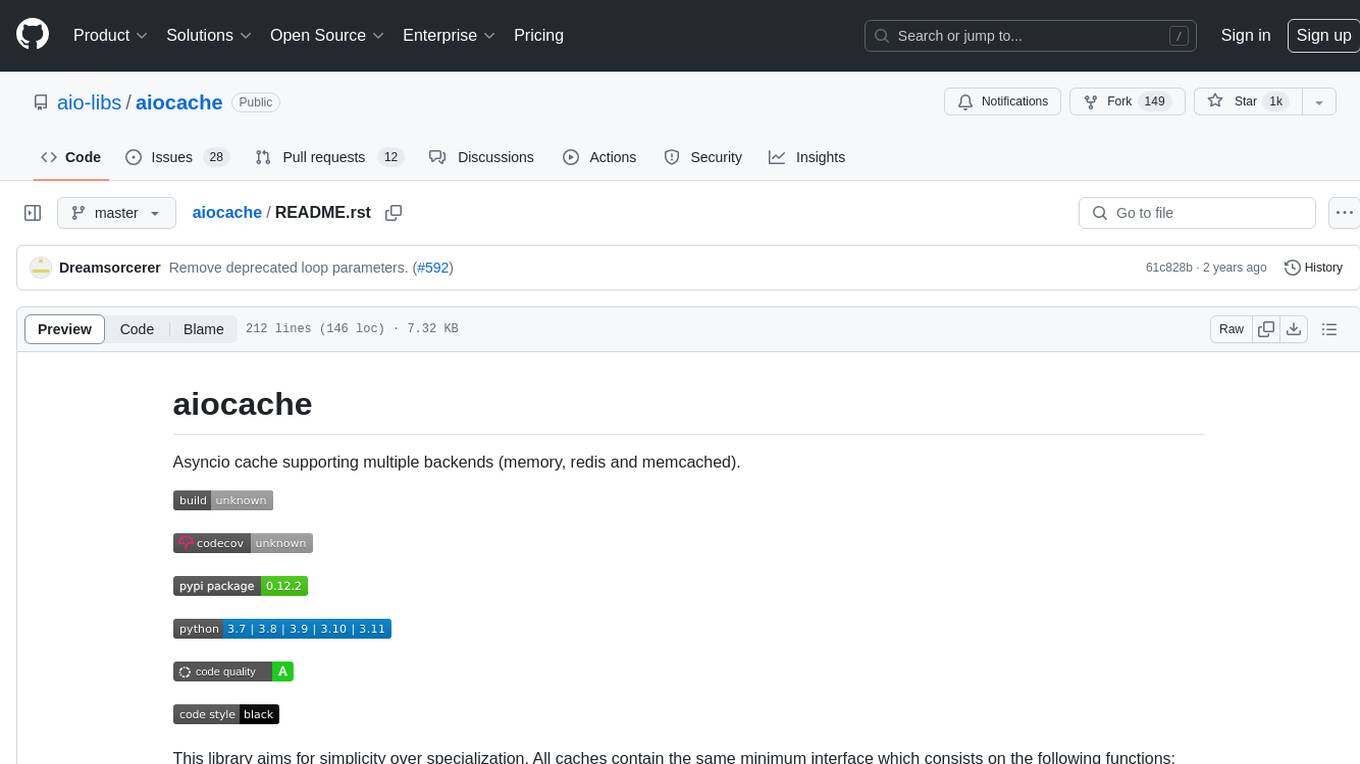
Aiocache is an asyncio cache library that supports multiple backends such as memory, redis, and memcached. It provides a simple interface for functions like add, get, set, multi_get, multi_set, exists, increment, delete, clear, and raw. Users can easily install and use the library for caching data in Python applications. Aiocache allows for easy instantiation of caches and setup of cache aliases for reusing configurations. It also provides support for backends, serializers, and plugins to customize cache operations. The library offers detailed documentation and examples for different use cases and configurations.
README:
aiocache ########
Asyncio cache supporting multiple backends (memory, redis and memcached).
.. image:: https://travis-ci.org/argaen/aiocache.svg?branch=master :target: https://travis-ci.org/argaen/aiocache
.. image:: https://codecov.io/gh/argaen/aiocache/branch/master/graph/badge.svg :target: https://codecov.io/gh/argaen/aiocache
.. image:: https://badge.fury.io/py/aiocache.svg :target: https://pypi.python.org/pypi/aiocache
.. image:: https://img.shields.io/pypi/pyversions/aiocache.svg :target: https://pypi.python.org/pypi/aiocache
.. image:: https://api.codacy.com/project/badge/Grade/96f772e38e63489ca884dbaf6e9fb7fd :target: https://www.codacy.com/app/argaen/aiocache
.. image:: https://img.shields.io/badge/code%20style-black-000000.svg :target: https://github.com/ambv/black
This library aims for simplicity over specialization. All caches contain the same minimum interface which consists on the following functions:
-
add: Only adds key/value if key does not exist. -
get: Retrieve value identified by key. -
set: Sets key/value. -
multi_get: Retrieves multiple key/values. -
multi_set: Sets multiple key/values. -
exists: Returns True if key exists False otherwise. -
increment: Increment the value stored in the given key. -
delete: Deletes key and returns number of deleted items. -
clear: Clears the items stored. -
raw: Executes the specified command using the underlying client.
.. role:: python(code) :language: python
.. contents::
.. section-numbering:
pip install aiocachepip install aiocache[redis]pip install aiocache[memcached]pip install aiocache[redis,memcached]pip install aiocache[msgpack]
Using a cache is as simple as
.. code-block:: python
>>> import asyncio
>>> from aiocache import Cache
>>> cache = Cache(Cache.MEMORY) # Here you can also use Cache.REDIS and Cache.MEMCACHED, default is Cache.MEMORY
>>> with asyncio.Runner() as runner:
>>> runner.run(cache.set('key', 'value'))
True
>>> runner.run(cache.get('key'))
'value'
Or as a decorator
.. code-block:: python
import asyncio
from collections import namedtuple
from aiocache import cached, Cache
from aiocache.serializers import PickleSerializer
# With this we can store python objects in backends like Redis!
Result = namedtuple('Result', "content, status")
@cached(
cache=RedisCache(), key="key", serializer=PickleSerializer(), port=6379, namespace="main")
async def cached_call():
print("Sleeping for three seconds zzzz.....")
await asyncio.sleep(3)
return Result("content", 200)
async def run():
await cached_call()
await cached_call()
await cached_call()
cache = Cache(Cache.REDIS, endpoint="127.0.0.1", port=6379, namespace="main")
await cache.delete("key")
if __name__ == "__main__":
asyncio.run(run())
The recommended approach to instantiate a new cache is using the Cache constructor. However you can also instantiate directly using aiocache.RedisCache, aiocache.SimpleMemoryCache or aiocache.MemcachedCache.
You can also setup cache aliases so its easy to reuse configurations
.. code-block:: python
import asyncio
from aiocache import caches
caches.set_config({ 'default': { 'cache': "aiocache.SimpleMemoryCache", 'serializer': { 'class': "aiocache.serializers.StringSerializer" } }, 'redis_alt': { 'cache': "aiocache.RedisCache", 'endpoint': "127.0.0.1", 'port': 6379, 'timeout': 1, 'serializer': { 'class': "aiocache.serializers.PickleSerializer" }, 'plugins': [ {'class': "aiocache.plugins.HitMissRatioPlugin"}, {'class': "aiocache.plugins.TimingPlugin"} ] } })
async def default_cache(): cache = caches.get('default') # This always returns the SAME instance await cache.set("key", "value") assert await cache.get("key") == "value"
async def alt_cache(): cache = caches.create('redis_alt') # This creates a NEW instance on every call await cache.set("key", "value") assert await cache.get("key") == "value"
async def test_alias(): await default_cache() await alt_cache()
await caches.get("redis_alt").delete("key")
if name == "main": asyncio.run(test_alias())
Aiocache provides 3 main entities:
- backends: Allow you specify which backend you want to use for your cache. Currently supporting: SimpleMemoryCache, RedisCache using redis_ and MemCache using aiomcache_.
- serializers: Serialize and deserialize the data between your code and the backends. This allows you to save any Python object into your cache. Currently supporting: StringSerializer, PickleSerializer, JsonSerializer, and MsgPackSerializer. But you can also build custom ones.
- plugins: Implement a hooks system that allows to execute extra behavior before and after of each command.
If you are missing an implementation of backend, serializer or plugin you think it could be interesting for the package, do not hesitate to open a new issue.
.. image:: docs/images/architecture.png :align: center
Those 3 entities combine during some of the cache operations to apply the desired command (backend), data transformation (serializer) and pre/post hooks (plugins). To have a better vision of what happens, here you can check how set function works in aiocache:
.. image:: docs/images/set_operation_flow.png :align: center
In examples folder <https://github.com/argaen/aiocache/tree/master/examples>_ you can check different use cases:
-
Sanic, Aiohttp and Tornado <https://github.com/argaen/aiocache/tree/master/examples/frameworks>_ -
Python object in Redis <https://github.com/argaen/aiocache/blob/master/examples/python_object.py>_ -
Custom serializer for compressing data <https://github.com/argaen/aiocache/blob/master/examples/serializer_class.py>_ -
TimingPlugin and HitMissRatioPlugin demos <https://github.com/argaen/aiocache/blob/master/examples/plugins.py>_ -
Using marshmallow as a serializer <https://github.com/argaen/aiocache/blob/master/examples/marshmallow_serializer_class.py>_ -
Using cached decorator <https://github.com/argaen/aiocache/blob/master/examples/cached_decorator.py>_. -
Using multi_cached decorator <https://github.com/argaen/aiocache/blob/master/examples/multicached_decorator.py>_.
-
Usage <http://aiocache.readthedocs.io/en/latest>_ -
Caches <http://aiocache.readthedocs.io/en/latest/caches.html>_ -
Serializers <http://aiocache.readthedocs.io/en/latest/serializers.html>_ -
Plugins <http://aiocache.readthedocs.io/en/latest/plugins.html>_ -
Configuration <http://aiocache.readthedocs.io/en/latest/configuration.html>_ -
Decorators <http://aiocache.readthedocs.io/en/latest/decorators.html>_ -
Testing <http://aiocache.readthedocs.io/en/latest/testing.html>_ -
Examples <https://github.com/argaen/aiocache/tree/master/examples>_
.. _redis: https://github.com/redis/redis-py .. _aiomcache: https://github.com/aio-libs/aiomcache
For Tasks:
Click tags to check more tools for each tasksFor Jobs:
Alternative AI tools for aiocache
Similar Open Source Tools

aiocache
Aiocache is an asyncio cache library that supports multiple backends such as memory, redis, and memcached. It provides a simple interface for functions like add, get, set, multi_get, multi_set, exists, increment, delete, clear, and raw. Users can easily install and use the library for caching data in Python applications. Aiocache allows for easy instantiation of caches and setup of cache aliases for reusing configurations. It also provides support for backends, serializers, and plugins to customize cache operations. The library offers detailed documentation and examples for different use cases and configurations.
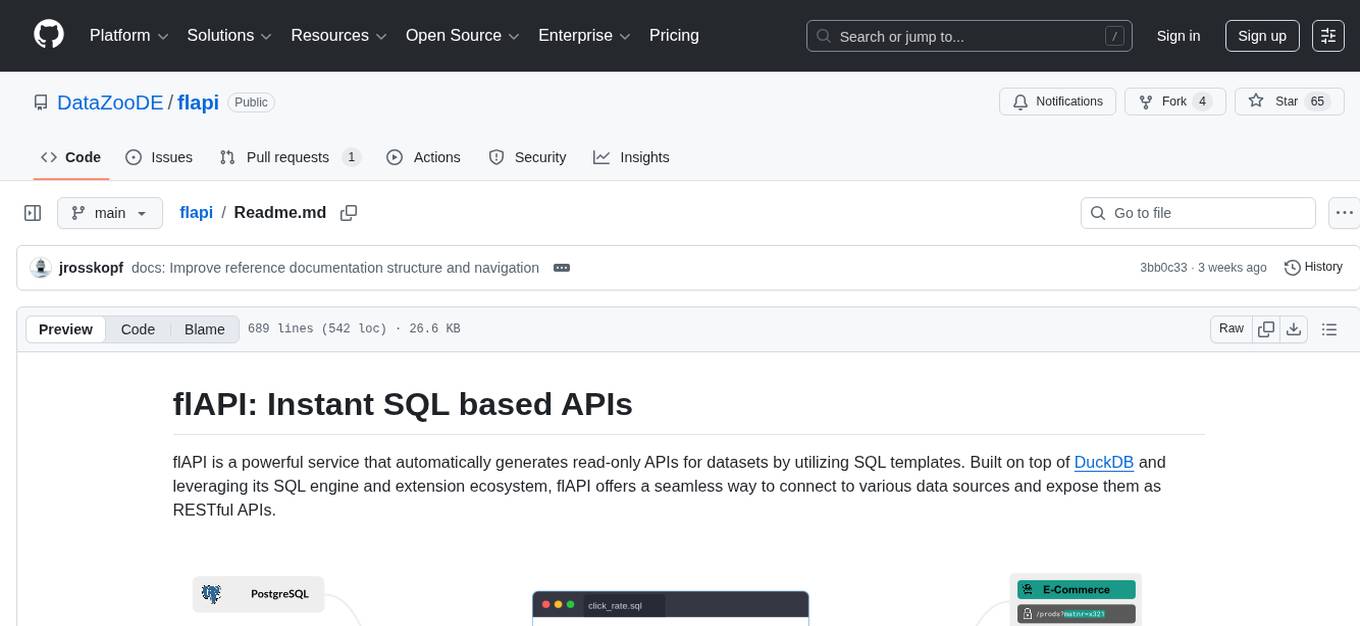
flapi
flAPI is a powerful service that automatically generates read-only APIs for datasets by utilizing SQL templates. Built on top of DuckDB, it offers features like automatic API generation, support for Model Context Protocol (MCP), connecting to multiple data sources, caching, security implementation, and easy deployment. The tool allows users to create APIs without coding and enables the creation of AI tools alongside REST endpoints using SQL templates. It supports unified configuration for REST endpoints and MCP tools/resources, concurrent servers for REST API and MCP server, and automatic tool discovery. The tool also provides DuckLake-backed caching for modern, snapshot-based caching with features like full refresh, incremental sync, retention, compaction, and audit logs.
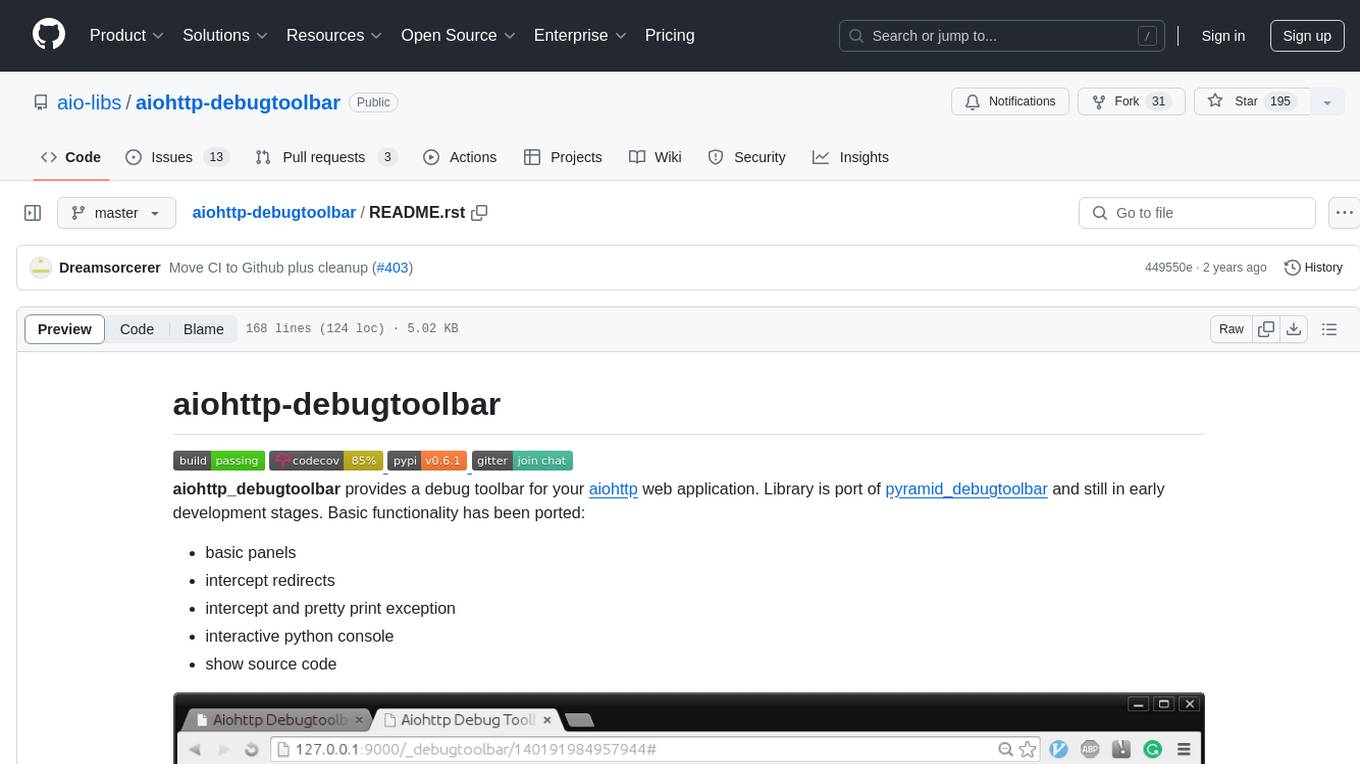
aiohttp-debugtoolbar
aiohttp_debugtoolbar provides a debug toolbar for aiohttp web applications. It is a port of pyramid_debugtoolbar and offers basic functionality such as basic panels, intercepting redirects, pretty printing exceptions, an interactive python console, and showing source code. The library is still in early development stages and offers various debug panels for monitoring different aspects of the web application. It is a useful tool for developers working with aiohttp to debug and optimize their applications.
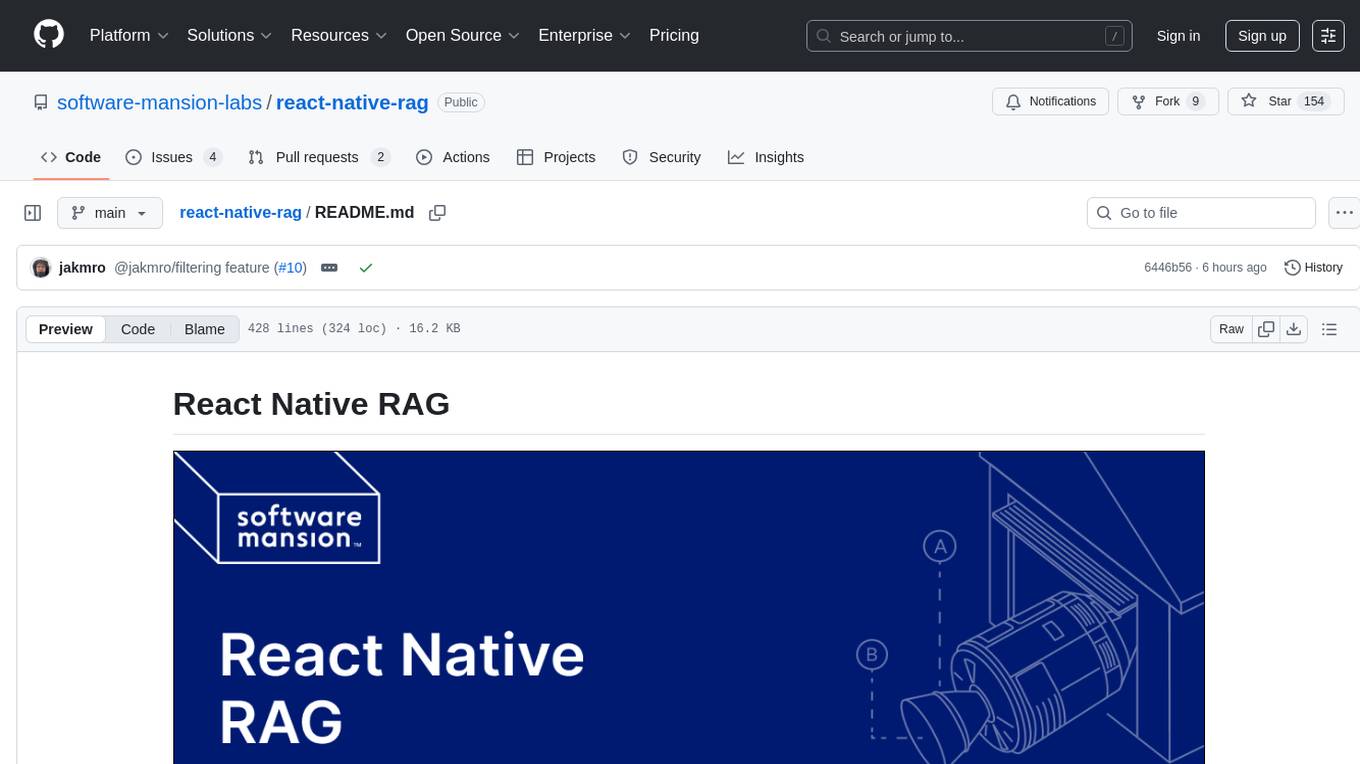
react-native-rag
React Native RAG is a library that enables private, local RAGs to supercharge LLMs with a custom knowledge base. It offers modular and extensible components like `LLM`, `Embeddings`, `VectorStore`, and `TextSplitter`, with multiple integration options. The library supports on-device inference, vector store persistence, and semantic search implementation. Users can easily generate text responses, manage documents, and utilize custom components for advanced use cases.
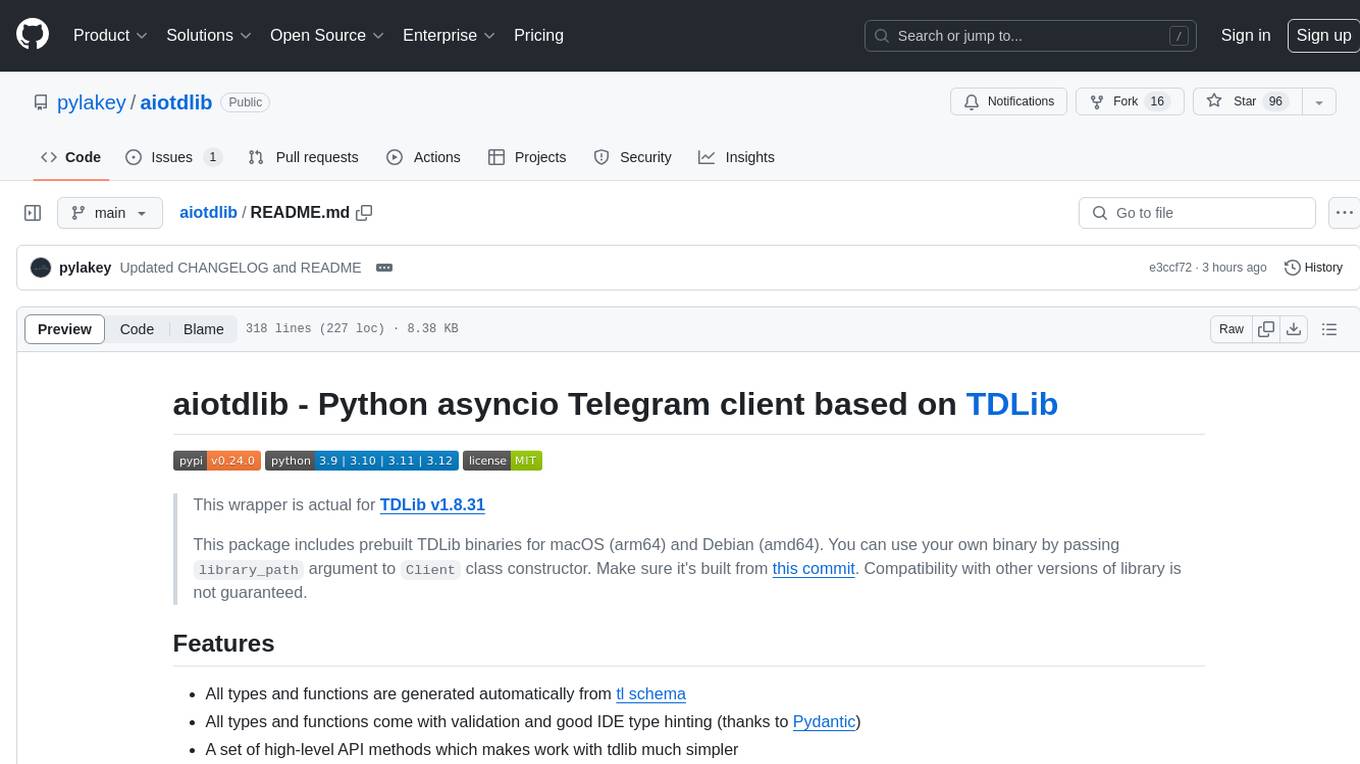
aiotdlib
aiotdlib is a Python asyncio Telegram client based on TDLib. It provides automatic generation of types and functions from tl schema, validation, good IDE type hinting, and high-level API methods for simpler work with tdlib. The package includes prebuilt TDLib binaries for macOS (arm64) and Debian Bullseye (amd64). Users can use their own binary by passing `library_path` argument to `Client` class constructor. Compatibility with other versions of the library is not guaranteed. The tool requires Python 3.9+ and users need to get their `api_id` and `api_hash` from Telegram docs for installation and usage.
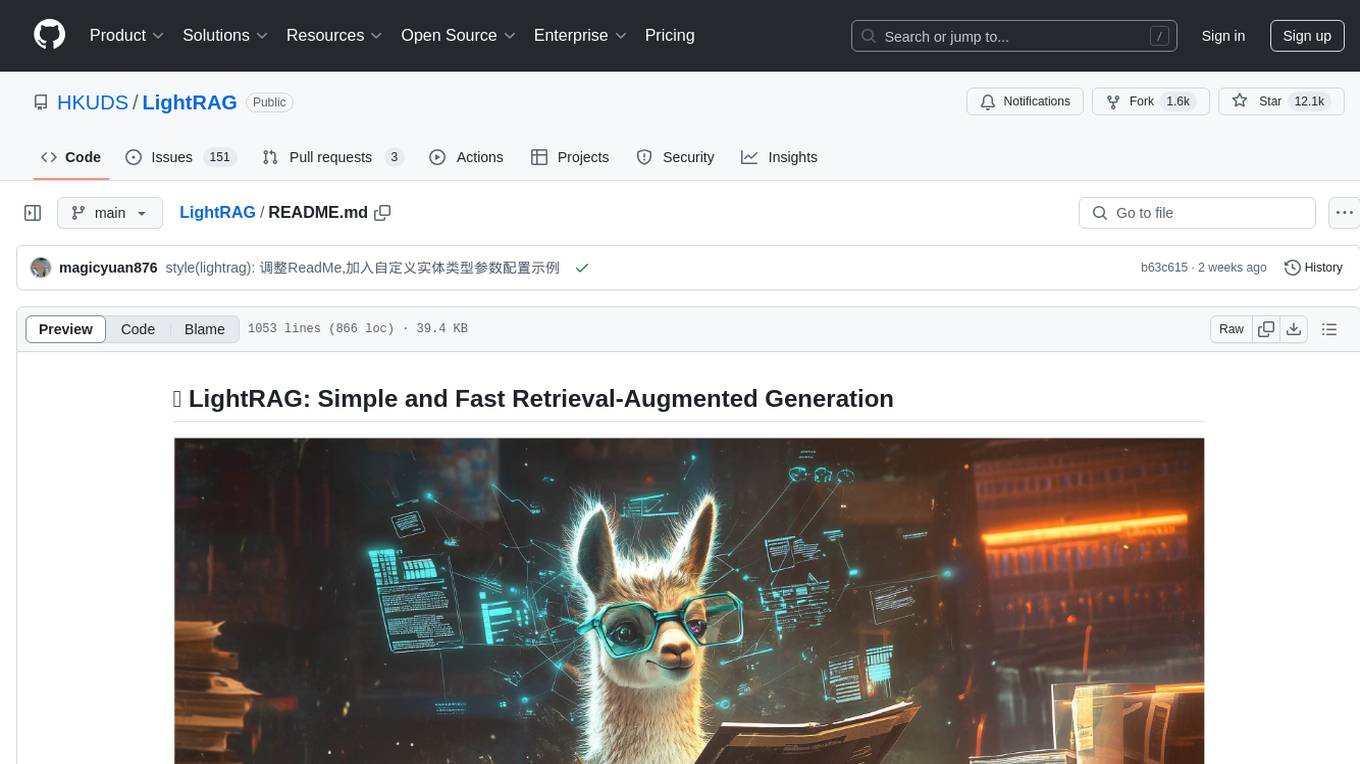
LightRAG
LightRAG is a repository hosting the code for LightRAG, a system that supports seamless integration of custom knowledge graphs, Oracle Database 23ai, Neo4J for storage, and multiple file types. It includes features like entity deletion, batch insert, incremental insert, and graph visualization. LightRAG provides an API server implementation for RESTful API access to RAG operations, allowing users to interact with it through HTTP requests. The repository also includes evaluation scripts, code for reproducing results, and a comprehensive code structure.
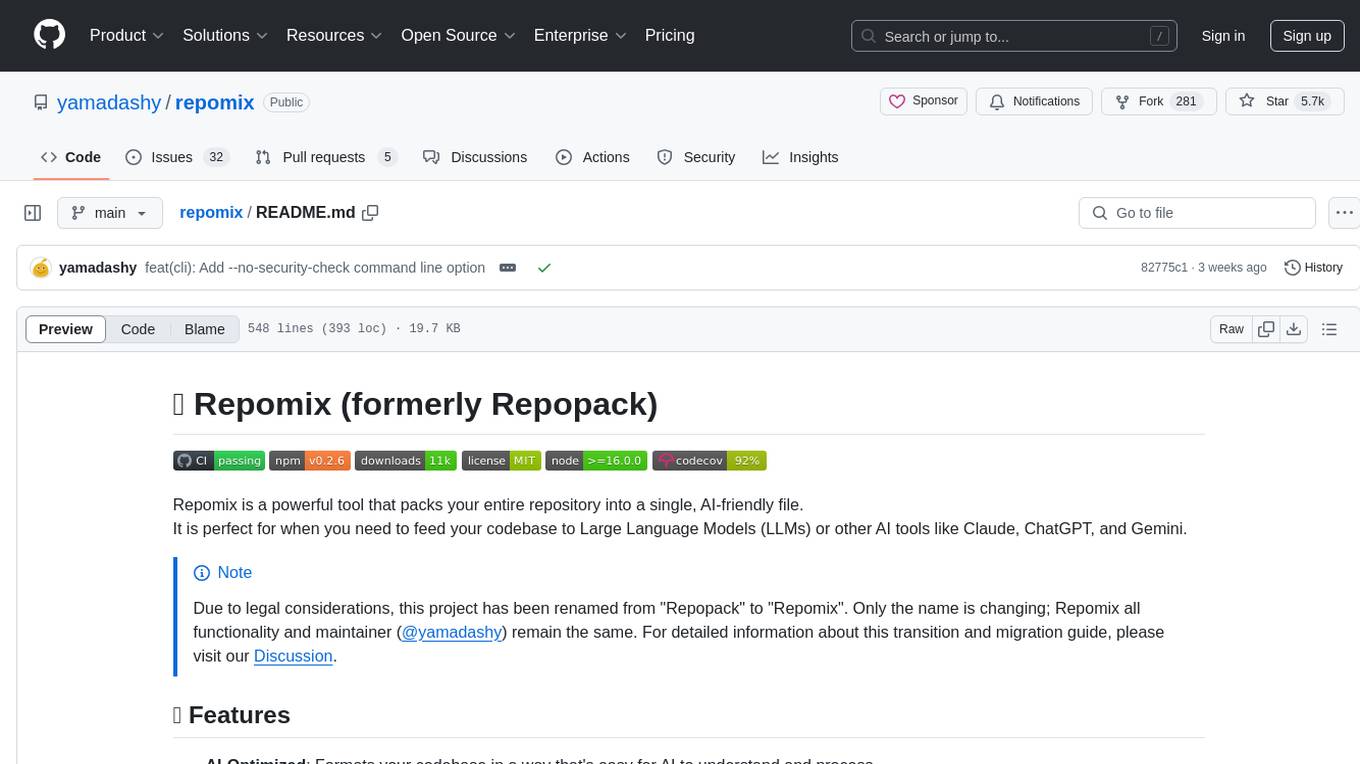
repomix
Repomix is a powerful tool that packs your entire repository into a single, AI-friendly file. It is designed to format your codebase for easy understanding by AI tools like Large Language Models (LLMs), Claude, ChatGPT, and Gemini. Repomix offers features such as AI optimization, token counting, simplicity in usage, customization options, Git awareness, and security-focused checks using Secretlint. It allows users to pack their entire repository or specific directories/files using glob patterns, and even supports processing remote Git repositories. The tool generates output in plain text, XML, or Markdown formats, with options for including/excluding files, removing comments, and performing security checks. Repomix also provides a global configuration option, custom instructions for AI context, and a security check feature to detect sensitive information in files.
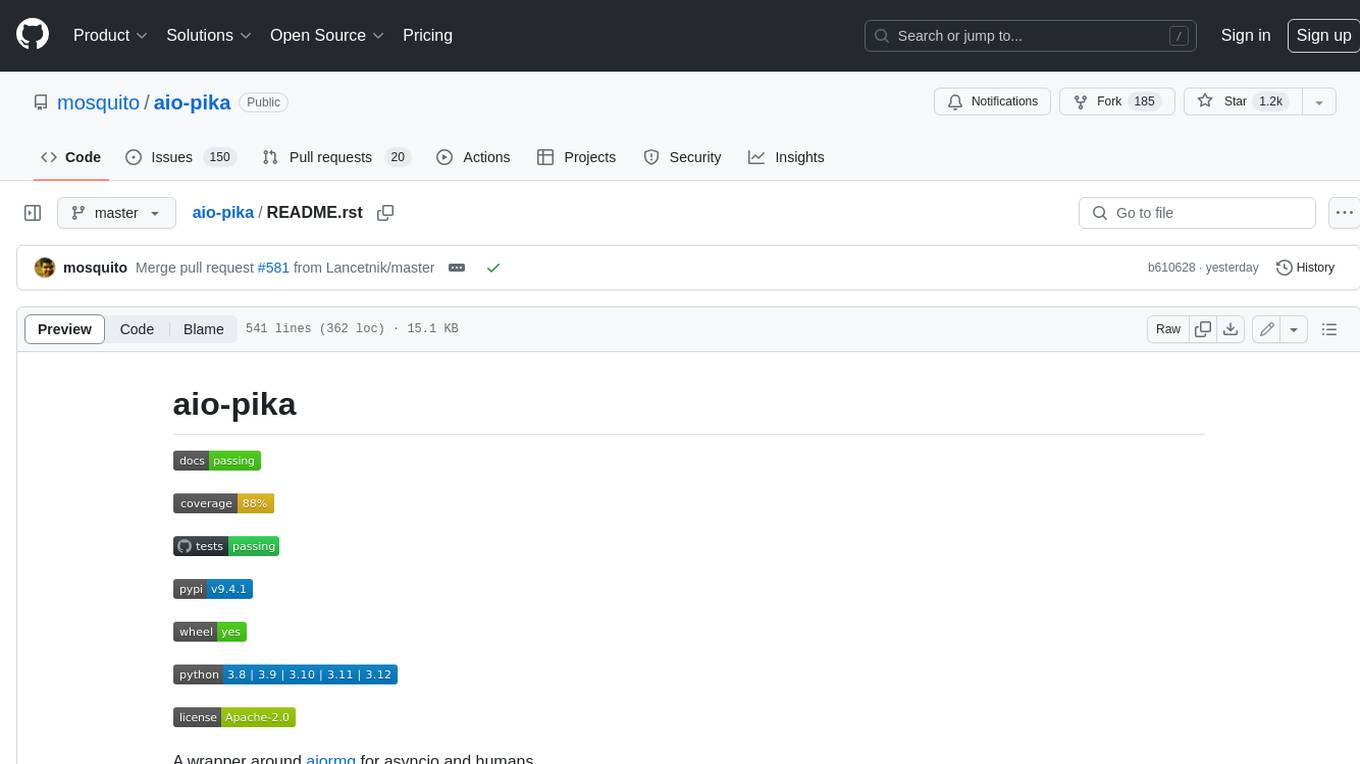
aio-pika
Aio-pika is a wrapper around aiormq for asyncio and humans. It provides a completely asynchronous API, object-oriented API, transparent auto-reconnects with complete state recovery, Python 3.7+ compatibility, transparent publisher confirms support, transactions support, and complete type-hints coverage.
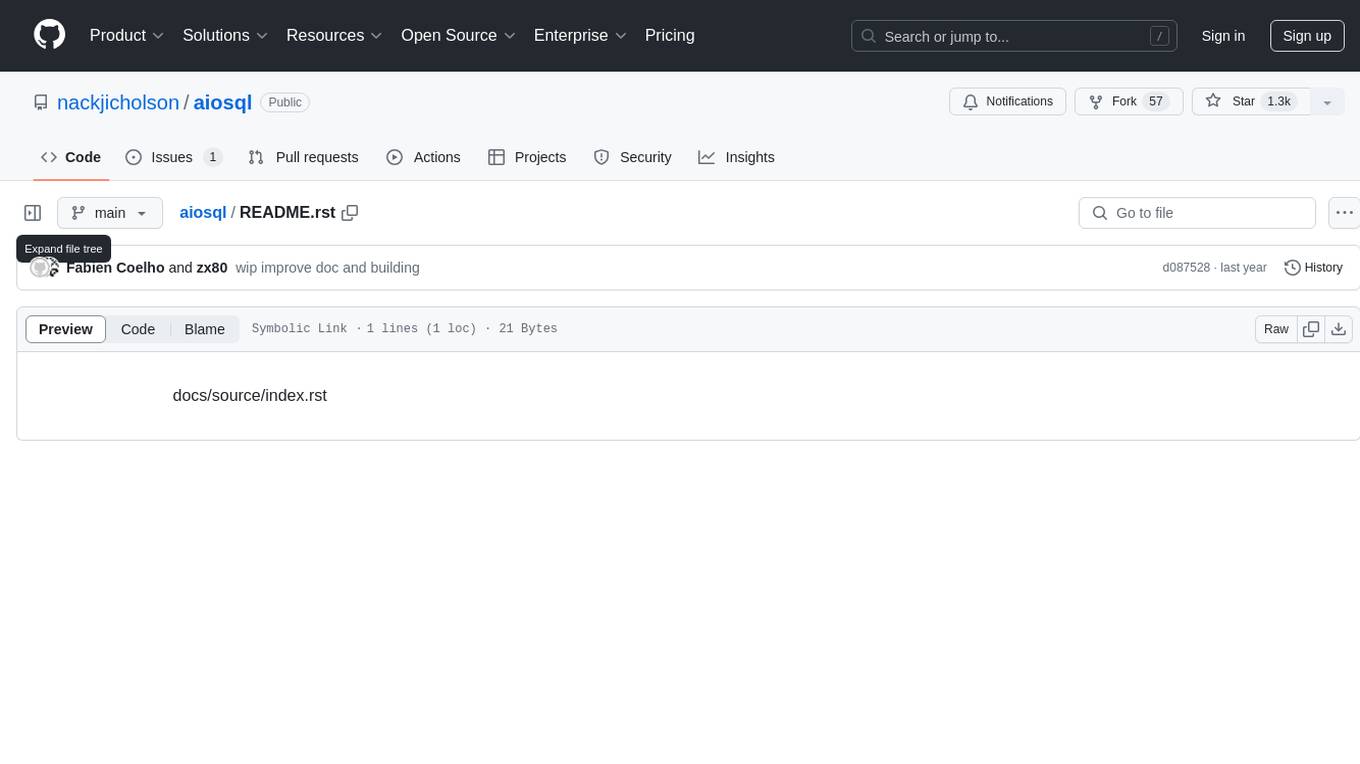
aiosql
aiosql is a Python module that allows you to organize SQL statements in .sql files and load them into your Python application as methods to call. It supports various database drivers like SQLite, PostgreSQL, MySQL, MariaDB, and DuckDB. The project is an implementation of Kris Jenkins' yesql library to the Python ecosystem, allowing users to easily reuse SQL code in SQL GUIs or CLI tools. With aiosql, you can write, version control, comment, and run SQL code using files without losing the ability to use them as you would any other SQL file. It provides support for PEP 249 and asyncio based drivers, enabling users to execute parametric SQL queries from Python methods.
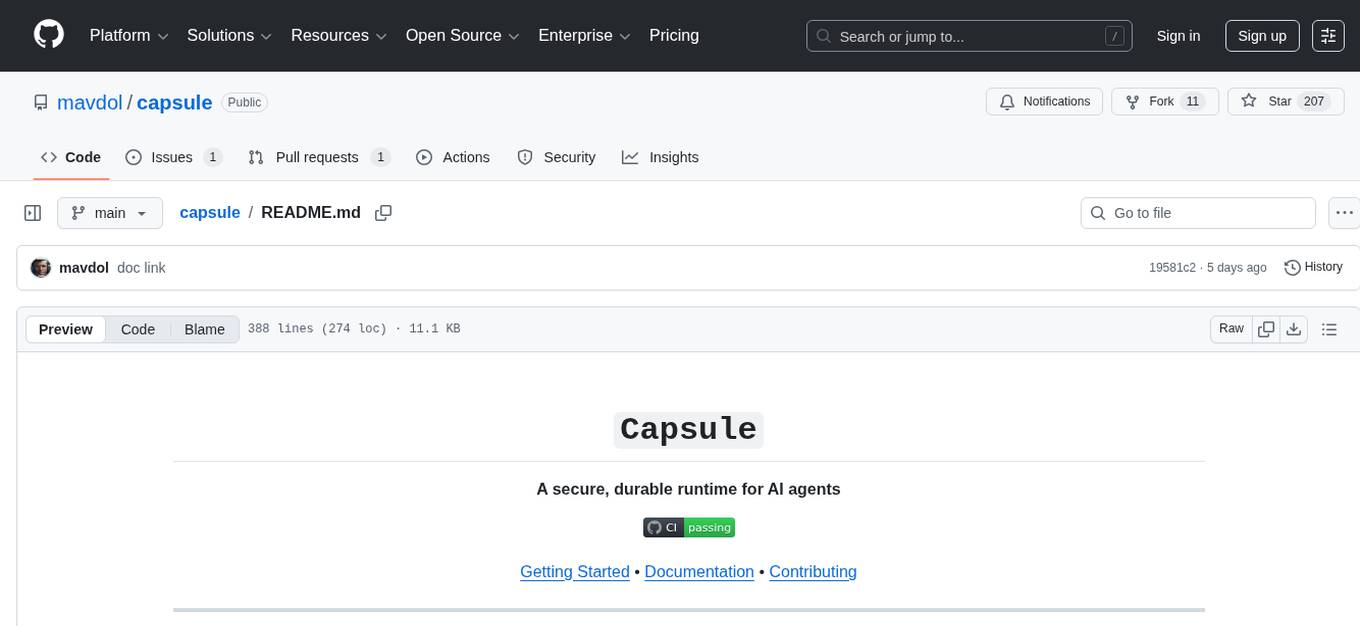
capsule
Capsule is a secure and durable runtime for AI agents, designed to coordinate tasks in isolated environments. It allows for long-running workflows, large-scale processing, autonomous decision-making, and multi-agent systems. Tasks run in WebAssembly sandboxes with isolated execution, resource limits, automatic retries, and lifecycle tracking. It enables safe execution of untrusted code within AI agent systems.
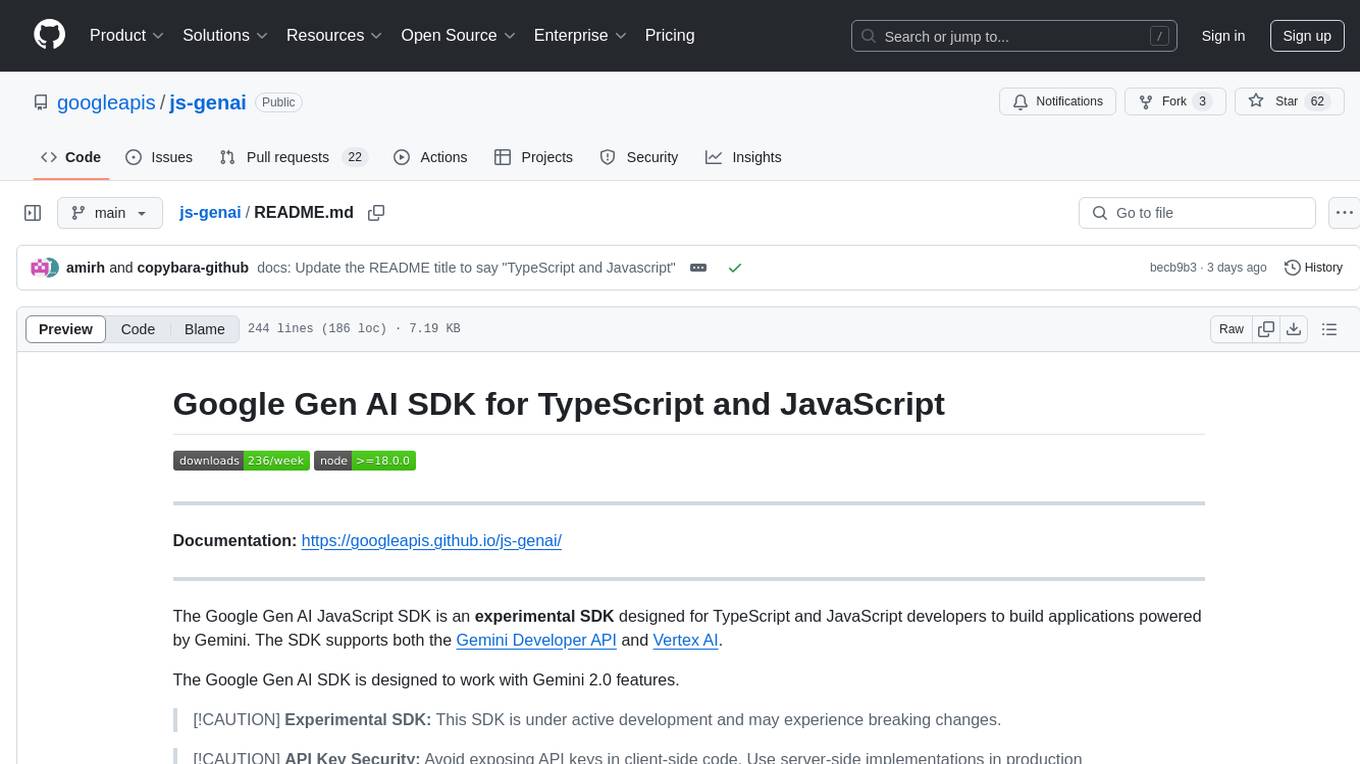
js-genai
The Google Gen AI JavaScript SDK is an experimental SDK for TypeScript and JavaScript developers to build applications powered by Gemini. It supports both the Gemini Developer API and Vertex AI. The SDK is designed to work with Gemini 2.0 features. Users can access API features through the GoogleGenAI classes, which provide submodules for querying models, managing caches, creating chats, uploading files, and starting live sessions. The SDK also allows for function calling to interact with external systems. Users can find more samples in the GitHub samples directory.

instructor
Instructor is a popular Python library for managing structured outputs from large language models (LLMs). It offers a user-friendly API for validation, retries, and streaming responses. With support for various LLM providers and multiple languages, Instructor simplifies working with LLM outputs. The library includes features like response models, retry management, validation, streaming support, and flexible backends. It also provides hooks for logging and monitoring LLM interactions, and supports integration with Anthropic, Cohere, Gemini, Litellm, and Google AI models. Instructor facilitates tasks such as extracting user data from natural language, creating fine-tuned models, managing uploaded files, and monitoring usage of OpenAI models.
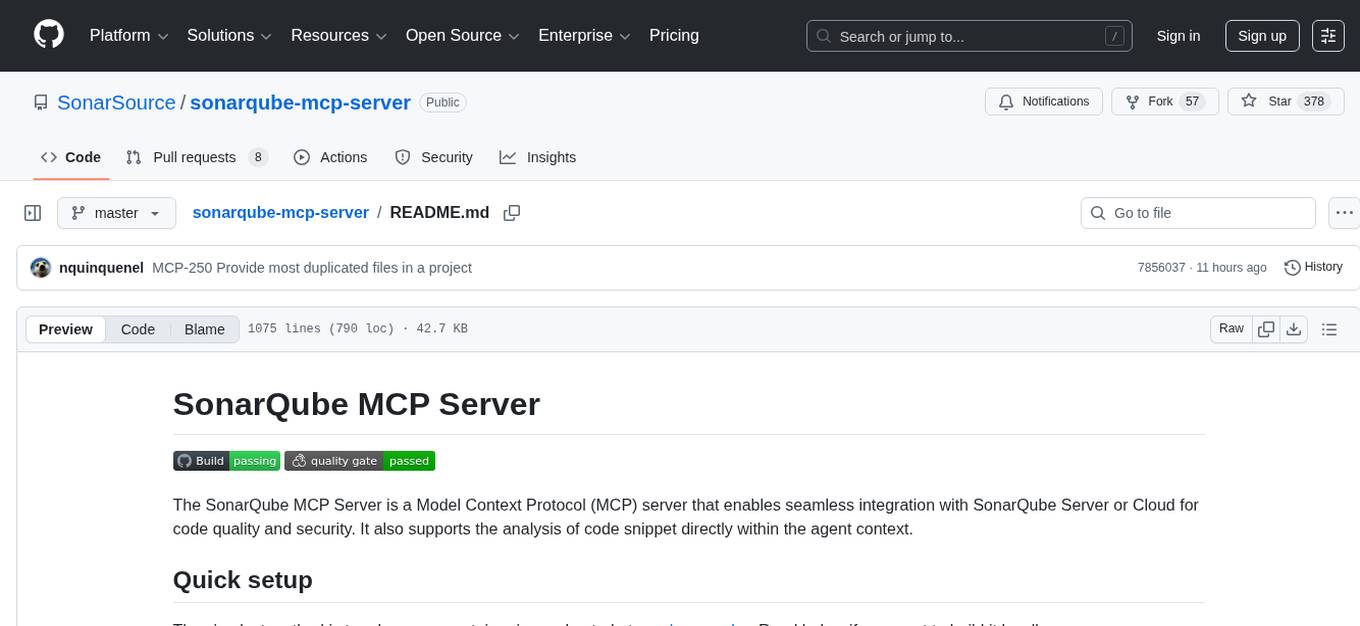
sonarqube-mcp-server
The SonarQube MCP Server is a Model Context Protocol (MCP) server that enables seamless integration with SonarQube Server or Cloud for code quality and security. It supports the analysis of code snippets directly within the agent context. The server provides various tools for analyzing code, managing issues, accessing metrics, and interacting with SonarQube projects. It also supports advanced features like dependency risk analysis, enterprise portfolio management, and system health checks. The server can be configured for different transport modes, proxy settings, and custom certificates. Telemetry data collection can be disabled if needed.
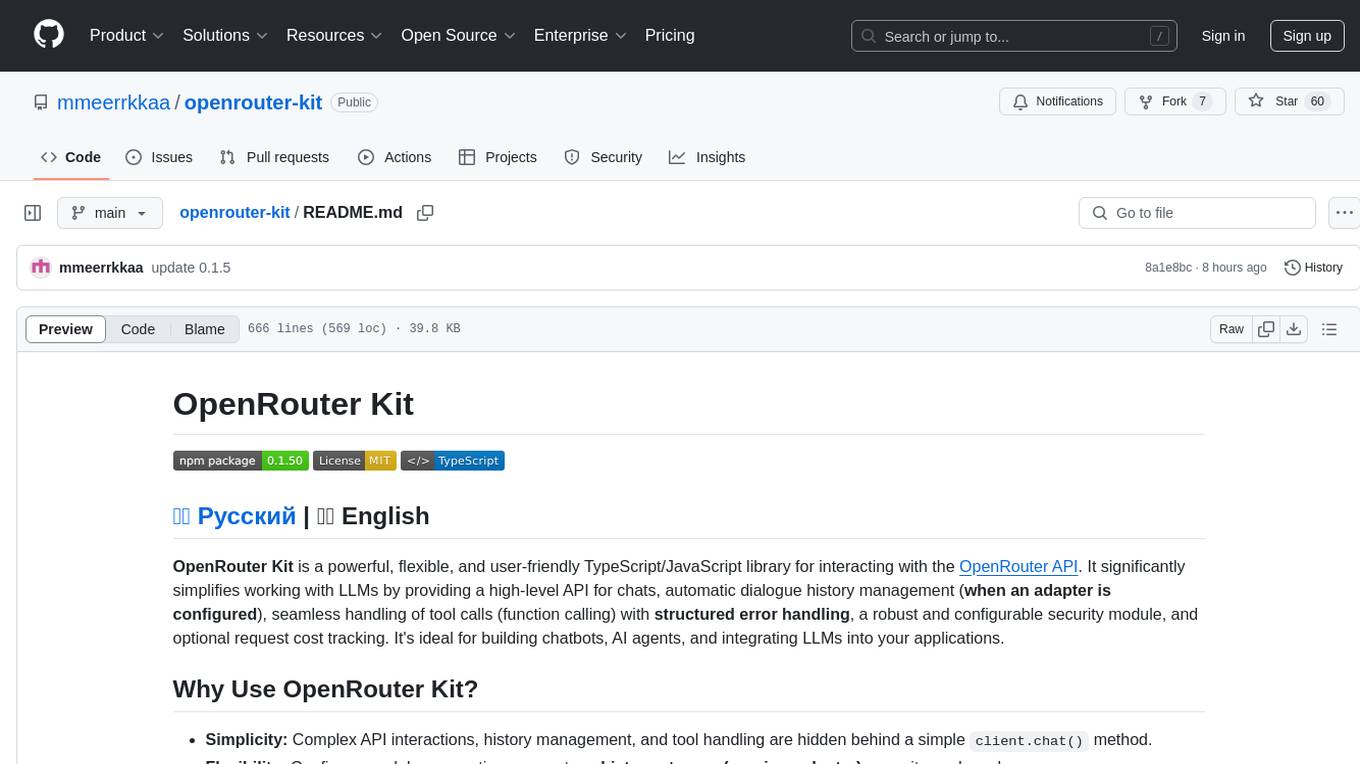
openrouter-kit
OpenRouter Kit is a powerful TypeScript/JavaScript library for interacting with the OpenRouter API. It simplifies working with LLMs by providing a high-level API for chats, dialogue history management, tool calls with error handling, security module, and cost tracking. Ideal for building chatbots, AI agents, and integrating LLMs into applications.
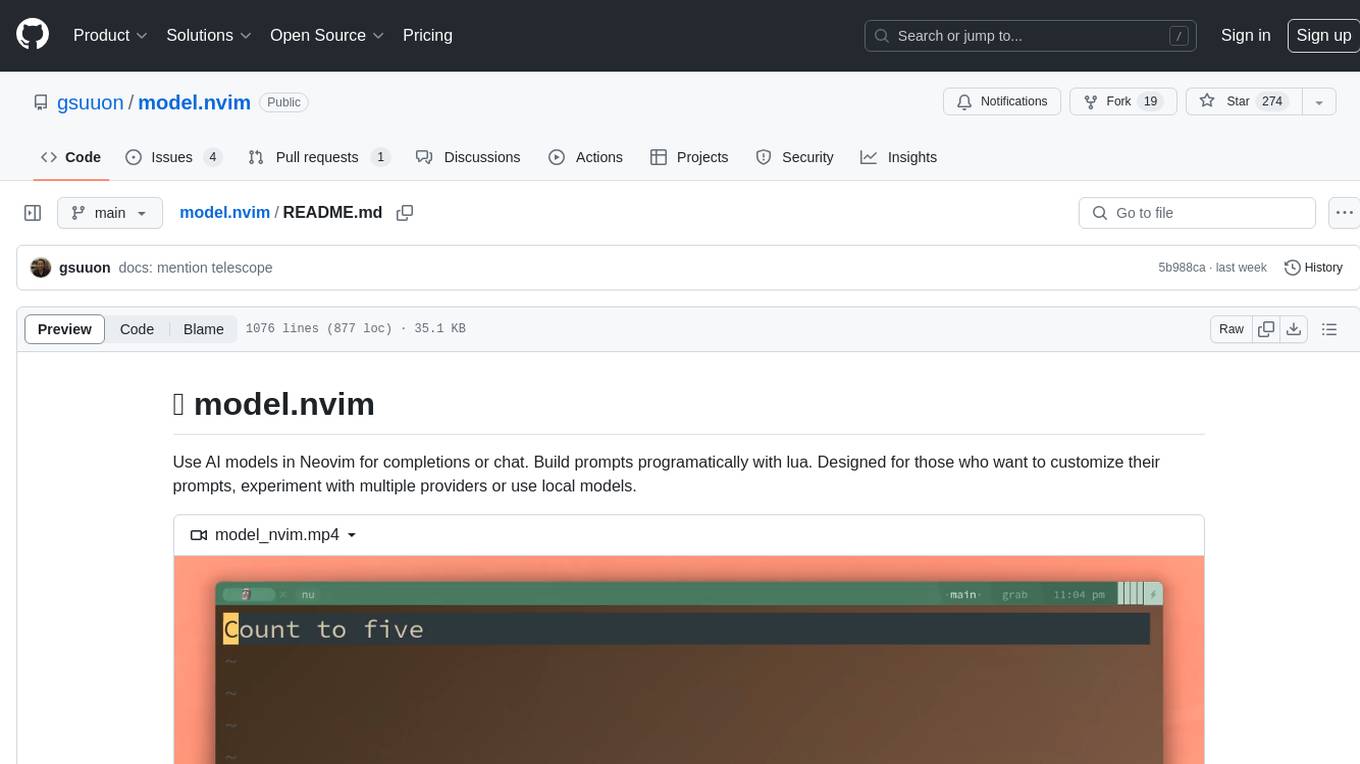
model.nvim
model.nvim is a tool designed for Neovim users who want to utilize AI models for completions or chat within their text editor. It allows users to build prompts programmatically with Lua, customize prompts, experiment with multiple providers, and use both hosted and local models. The tool supports features like provider agnosticism, programmatic prompts in Lua, async and multistep prompts, streaming completions, and chat functionality in 'mchat' filetype buffer. Users can customize prompts, manage responses, and context, and utilize various providers like OpenAI ChatGPT, Google PaLM, llama.cpp, ollama, and more. The tool also supports treesitter highlights and folds for chat buffers.
aiavatarkit
AIAvatarKit is a tool for building AI-based conversational avatars quickly. It supports various platforms like VRChat and cluster, along with real-world devices. The tool is extensible, allowing unlimited capabilities based on user needs. It requires VOICEVOX API, Google or Azure Speech Services API keys, and Python 3.10. Users can start conversations out of the box and enjoy seamless interactions with the avatars.
For similar tasks

aiocache
Aiocache is an asyncio cache library that supports multiple backends such as memory, redis, and memcached. It provides a simple interface for functions like add, get, set, multi_get, multi_set, exists, increment, delete, clear, and raw. Users can easily install and use the library for caching data in Python applications. Aiocache allows for easy instantiation of caches and setup of cache aliases for reusing configurations. It also provides support for backends, serializers, and plugins to customize cache operations. The library offers detailed documentation and examples for different use cases and configurations.
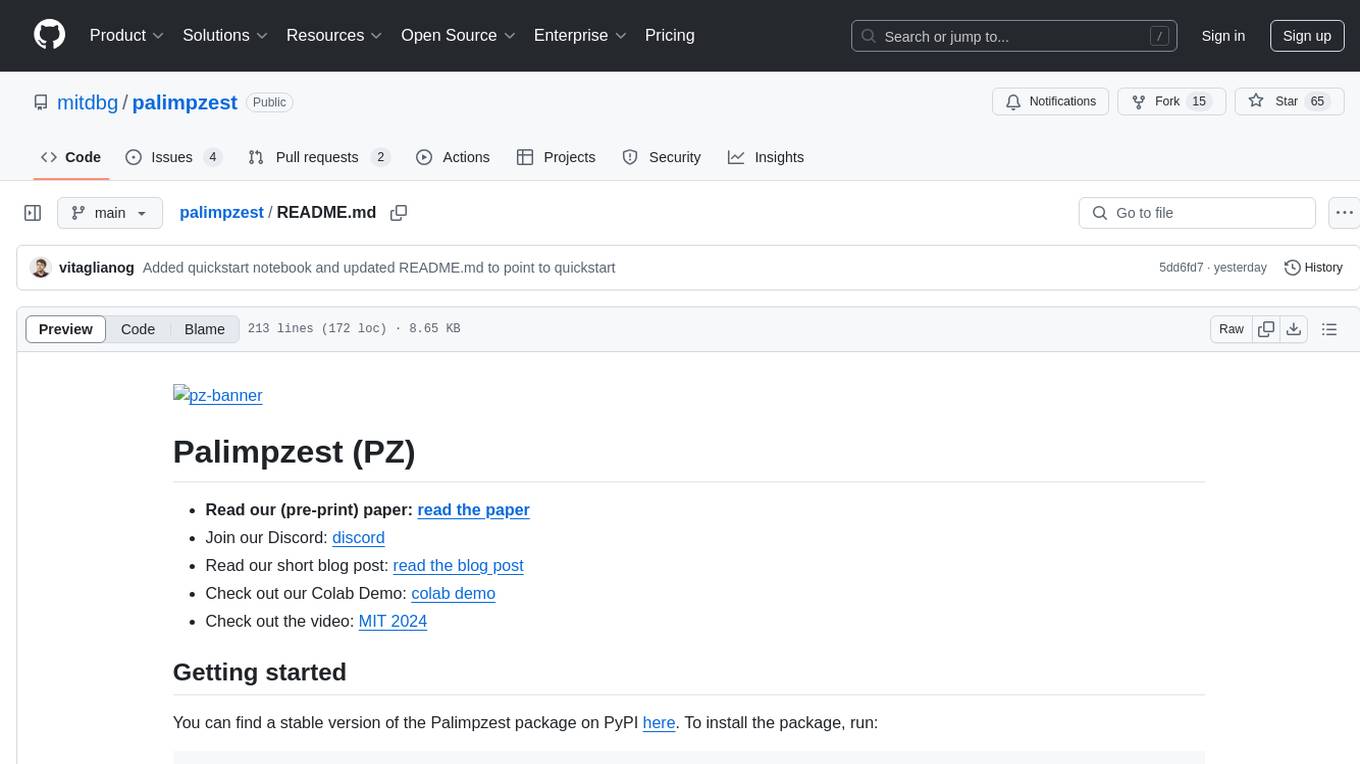
palimpzest
Palimpzest (PZ) is a tool for managing and optimizing workloads, particularly for data processing tasks. It provides a CLI tool and Python demos for users to register datasets, run workloads, and access results. Users can easily initialize their system, register datasets, and manage configurations using the CLI commands provided. Palimpzest also supports caching intermediate results and configuring for parallel execution with remote services like OpenAI and together.ai. The tool aims to streamline the workflow of working with datasets and optimizing performance for data extraction tasks.
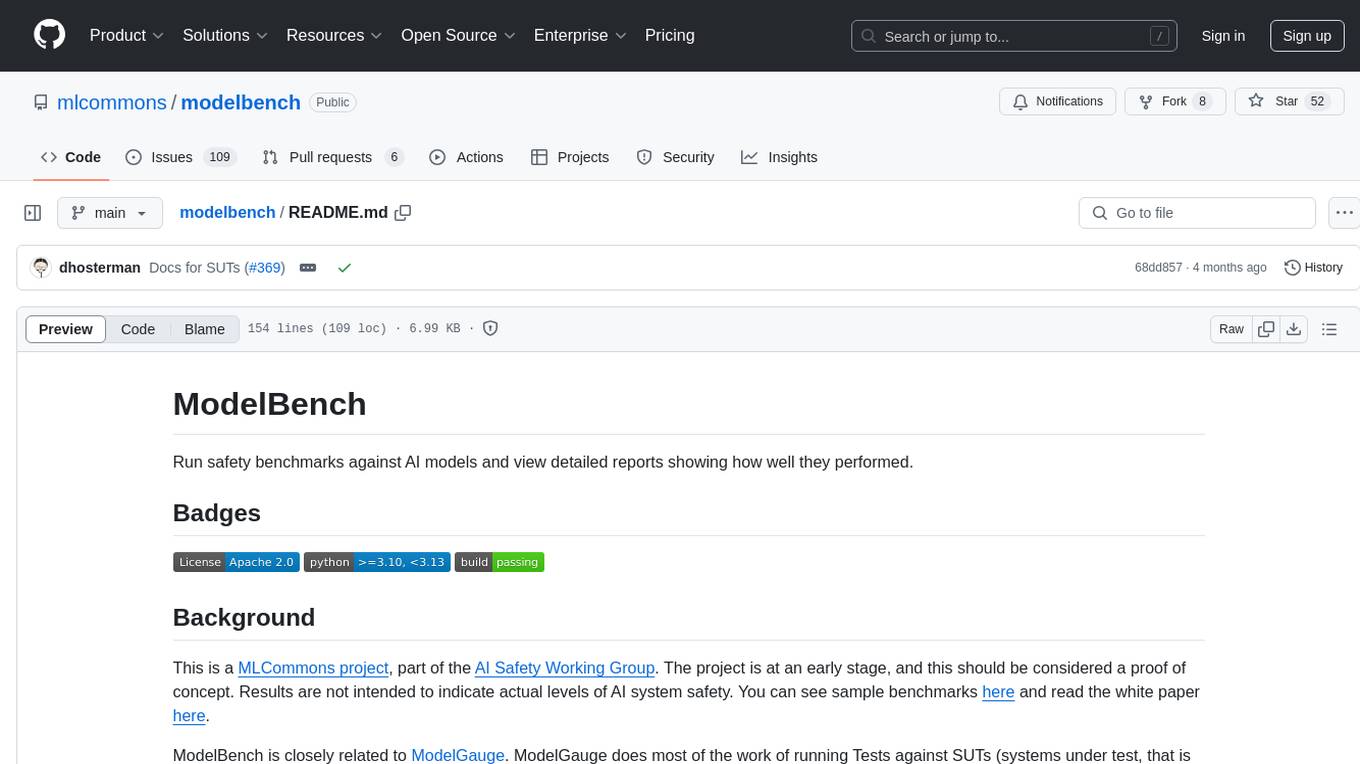
modelbench
ModelBench is a tool for running safety benchmarks against AI models and generating detailed reports. It is part of the MLCommons project and is designed as a proof of concept to aggregate measures, relate them to specific harms, create benchmarks, and produce reports. The tool requires LlamaGuard for evaluating responses and a TogetherAI account for running benchmarks. Users can install ModelBench from GitHub or PyPI, run tests using Poetry, and create benchmarks by providing necessary API keys. The tool generates static HTML pages displaying benchmark scores and allows users to dump raw scores and manage cache for faster runs. ModelBench is aimed at enabling users to test their own models and create tests and benchmarks.
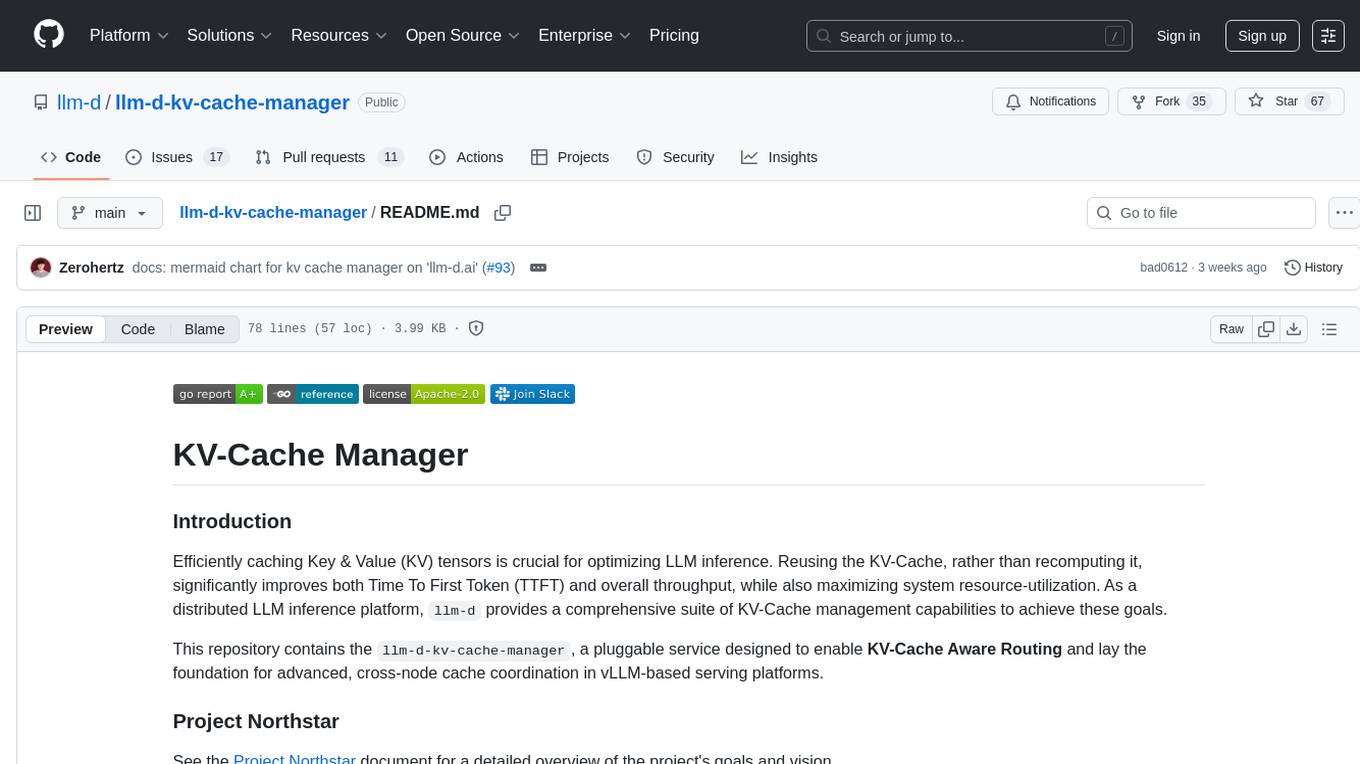
llm-d-kv-cache-manager
Efficiently caching Key & Value (KV) tensors is crucial for optimizing LLM inference. Reusing the KV-Cache significantly improves Time To First Token (TTFT) and overall throughput, maximizing system resource-utilization. `llm-d-kv-cache-manager` is a pluggable service enabling KV-Cache Aware Routing for vLLM-based serving platforms, with a high-performance KV-Cache Indexer component tracking KV-Block locality across vLLM pods. It provides intelligent routing for optimal KV-cache-aware placement decisions.
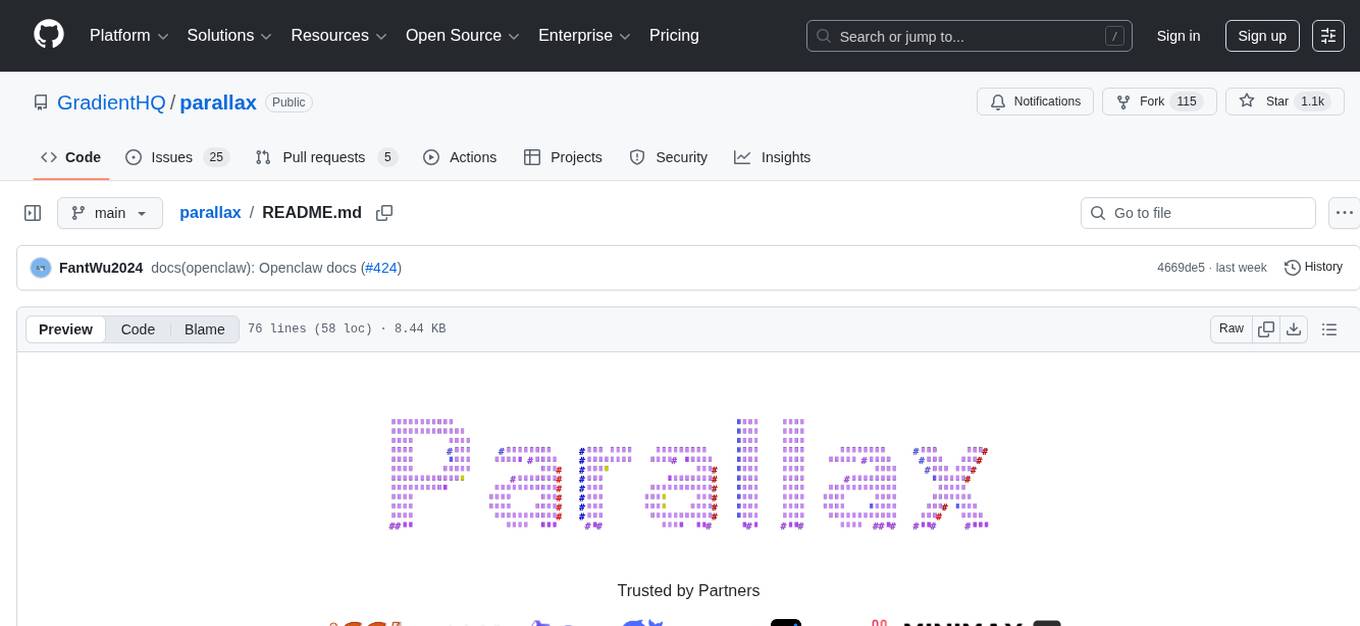
parallax
Parallax is a fully decentralized inference engine developed by Gradient. It allows users to build their own AI cluster for model inference across distributed nodes with varying configurations and physical locations. Core features include hosting local LLM on personal devices, cross-platform support, pipeline parallel model sharding, paged KV cache management, continuous batching for Mac, dynamic request scheduling, and routing for high performance. The backend architecture includes P2P communication powered by Lattica, GPU backend powered by SGLang and vLLM, and MAC backend powered by MLX LM.
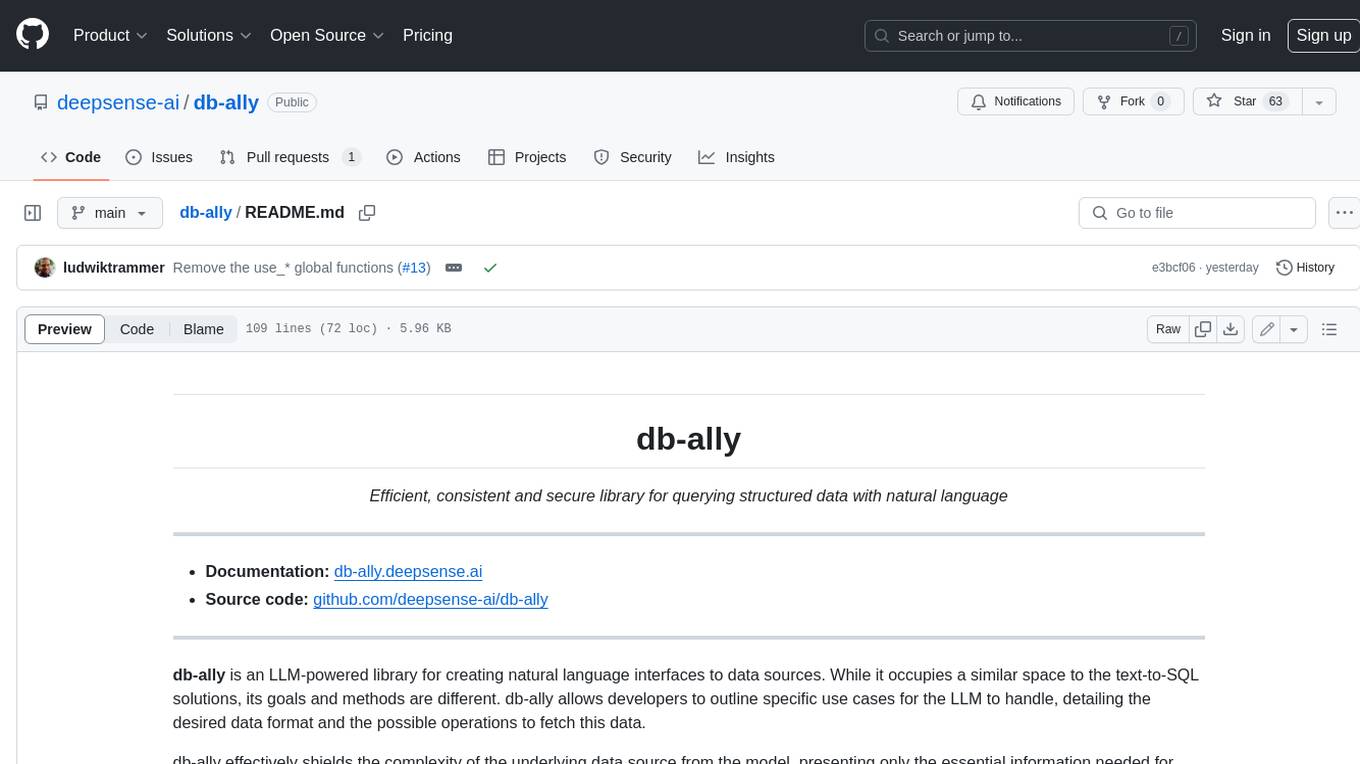
db-ally
db-ally is a library for creating natural language interfaces to data sources. It allows developers to outline specific use cases for a large language model (LLM) to handle, detailing the desired data format and the possible operations to fetch this data. db-ally effectively shields the complexity of the underlying data source from the model, presenting only the essential information needed for solving the specific use cases. Instead of generating arbitrary SQL, the model is asked to generate responses in a simplified query language.
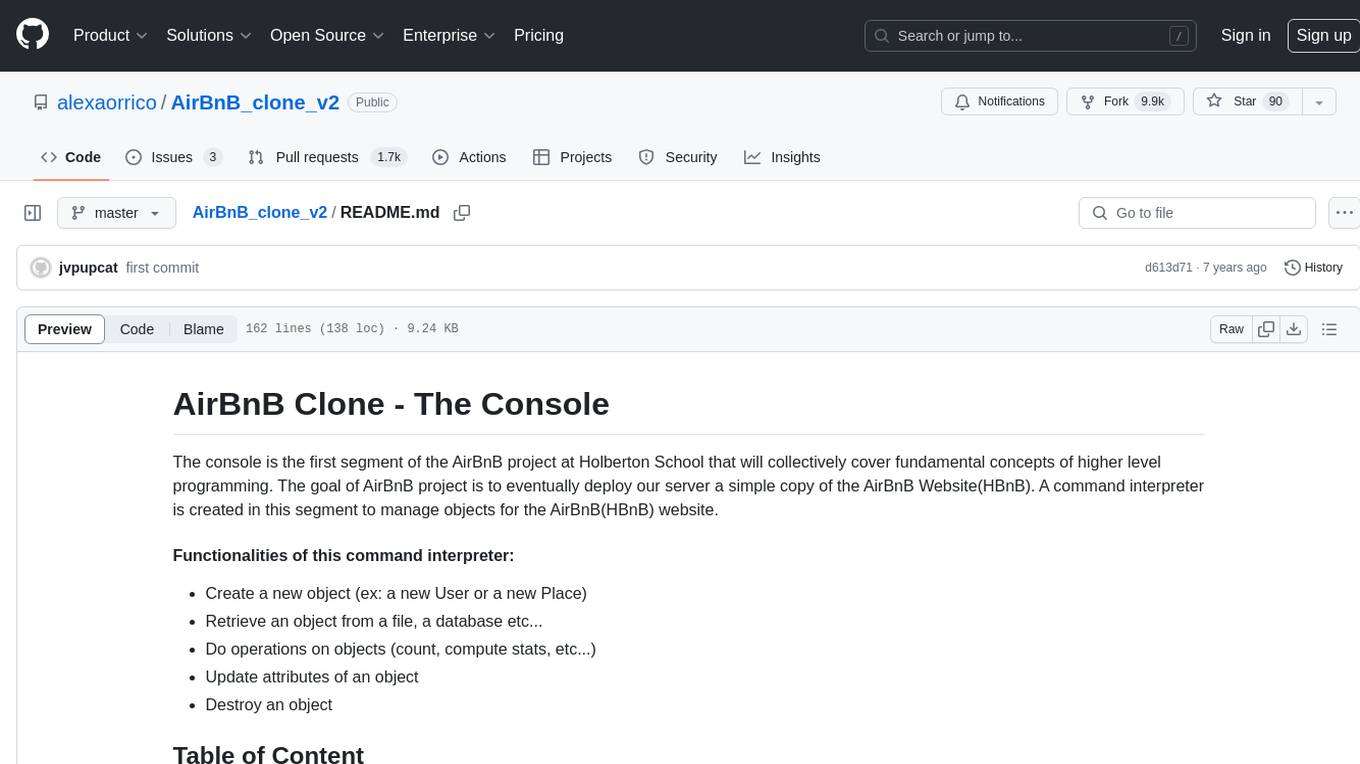
AirBnB_clone_v2
The AirBnB Clone - The Console project is the first segment of the AirBnB project at Holberton School, aiming to cover fundamental concepts of higher level programming. The goal is to deploy a server as a simple copy of the AirBnB Website (HBnB). The project includes a command interpreter to manage objects for the AirBnB website, allowing users to create new objects, retrieve objects, perform operations on objects, update object attributes, and destroy objects. The project is interpreted/tested on Ubuntu 14.04 LTS using Python 3.4.3.
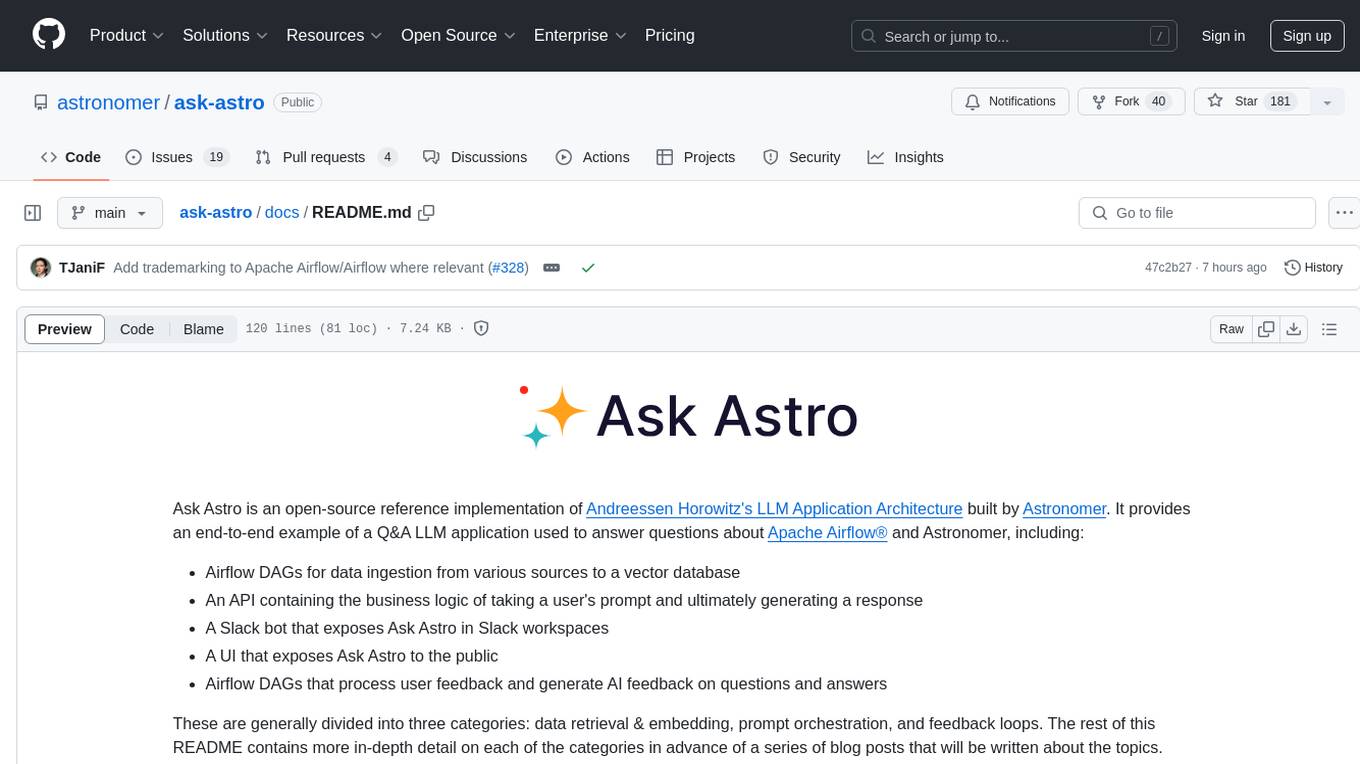
ask-astro
Ask Astro is an open-source reference implementation of Andreessen Horowitz's LLM Application Architecture built by Astronomer. It provides an end-to-end example of a Q&A LLM application used to answer questions about Apache Airflow® and Astronomer. Ask Astro includes Airflow DAGs for data ingestion, an API for business logic, a Slack bot, a public UI, and DAGs for processing user feedback. The tool is divided into data retrieval & embedding, prompt orchestration, and feedback loops.
For similar jobs

resonance
Resonance is a framework designed to facilitate interoperability and messaging between services in your infrastructure and beyond. It provides AI capabilities and takes full advantage of asynchronous PHP, built on top of Swoole. With Resonance, you can: * Chat with Open-Source LLMs: Create prompt controllers to directly answer user's prompts. LLM takes care of determining user's intention, so you can focus on taking appropriate action. * Asynchronous Where it Matters: Respond asynchronously to incoming RPC or WebSocket messages (or both combined) with little overhead. You can set up all the asynchronous features using attributes. No elaborate configuration is needed. * Simple Things Remain Simple: Writing HTTP controllers is similar to how it's done in the synchronous code. Controllers have new exciting features that take advantage of the asynchronous environment. * Consistency is Key: You can keep the same approach to writing software no matter the size of your project. There are no growing central configuration files or service dependencies registries. Every relation between code modules is local to those modules. * Promises in PHP: Resonance provides a partial implementation of Promise/A+ spec to handle various asynchronous tasks. * GraphQL Out of the Box: You can build elaborate GraphQL schemas by using just the PHP attributes. Resonance takes care of reusing SQL queries and optimizing the resources' usage. All fields can be resolved asynchronously.

aiogram_bot_template
Aiogram bot template is a boilerplate for creating Telegram bots using Aiogram framework. It provides a solid foundation for building robust and scalable bots with a focus on code organization, database integration, and localization.

pluto
Pluto is a development tool dedicated to helping developers **build cloud and AI applications more conveniently** , resolving issues such as the challenging deployment of AI applications and open-source models. Developers are able to write applications in familiar programming languages like **Python and TypeScript** , **directly defining and utilizing the cloud resources necessary for the application within their code base** , such as AWS SageMaker, DynamoDB, and more. Pluto automatically deduces the infrastructure resource needs of the app through **static program analysis** and proceeds to create these resources on the specified cloud platform, **simplifying the resources creation and application deployment process**.

pinecone-ts-client
The official Node.js client for Pinecone, written in TypeScript. This client library provides a high-level interface for interacting with the Pinecone vector database service. With this client, you can create and manage indexes, upsert and query vector data, and perform other operations related to vector search and retrieval. The client is designed to be easy to use and provides a consistent and idiomatic experience for Node.js developers. It supports all the features and functionality of the Pinecone API, making it a comprehensive solution for building vector-powered applications in Node.js.

aiohttp-pydantic
Aiohttp pydantic is an aiohttp view to easily parse and validate requests. You define using function annotations what your methods for handling HTTP verbs expect, and Aiohttp pydantic parses the HTTP request for you, validates the data, and injects the parameters you want. It provides features like query string, request body, URL path, and HTTP headers validation, as well as Open API Specification generation.

gcloud-aio
This repository contains shared codebase for two projects: gcloud-aio and gcloud-rest. gcloud-aio is built for Python 3's asyncio, while gcloud-rest is a threadsafe requests-based implementation. It provides clients for Google Cloud services like Auth, BigQuery, Datastore, KMS, PubSub, Storage, and Task Queue. Users can install the library using pip and refer to the documentation for usage details. Developers can contribute to the project by following the contribution guide.

aioconsole
aioconsole is a Python package that provides asynchronous console and interfaces for asyncio. It offers asynchronous equivalents to input, print, exec, and code.interact, an interactive loop running the asynchronous Python console, customization and running of command line interfaces using argparse, stream support to serve interfaces instead of using standard streams, and the apython script to access asyncio code at runtime without modifying the sources. The package requires Python version 3.8 or higher and can be installed from PyPI or GitHub. It allows users to run Python files or modules with a modified asyncio policy, replacing the default event loop with an interactive loop. aioconsole is useful for scenarios where users need to interact with asyncio code in a console environment.

aiosqlite
aiosqlite is a Python library that provides a friendly, async interface to SQLite databases. It replicates the standard sqlite3 module but with async versions of all the standard connection and cursor methods, along with context managers for automatically closing connections and cursors. It allows interaction with SQLite databases on the main AsyncIO event loop without blocking execution of other coroutines while waiting for queries or data fetches. The library also replicates most of the advanced features of sqlite3, such as row factories and total changes tracking.